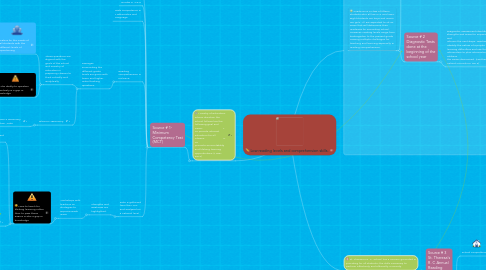
1. Ministry of Education whose direction the school follows has the following goal and vision: 1. To provide relevant education for all citizens. 2. To promote accountability and lifelong learning opportunities, (MOE, 2016)
1.1. Source # 1- Minimum Competency Test (MCT)
1.1.1. Administered by the Ministry of Education
1.1.2. All student of Grades 2, 4 & 5
1.1.3. Tests competence in Mathematics and Language
1.1.4. Reading comprehension is inclusive.
1.1.4.1. Passages surrounding the different grade levels are given with lower and higher order thinking questions.
1.1.4.1.1. These questions are aligned with the goals of the school and ministry of education in preparing citizens to think critically and analytically
1.1.4.1.2. Bloom's Taxonomy
1.1.5. Data is gathered from the MCT and analyzed on a national level
1.1.5.1. Strengths and weakness are highlighted.
1.1.5.1.1. Workshops with teachers on strategies to improve weak areas
2. Grade six is a class of fifteen students who all live in a rural area. Eight students are boys and seven are girls. All are expected to sit an exam that will determine their readiness for secondary school. However, reading levels range from kindergarten to the present grade causing multiple challenges for teaching and learning especially in reading comprehension.
2.1. The ability to read is one determiner of students' success or failure. They must form the habit of reading to perform well in all subjects. A good reader has a better opportunity for greater achievement, (Adeniji, & Omale, 2011)
2.1.1. The skill acquired in reading can promote the acquisition of language skills like listening, speaking, and writing (Adeniji & Omale, 2011)
2.2. Source # 2 Diagnostic Tests done at the beginning of the school year
2.2.1. Diagnostic assessment identifies strengths and areas for improvement and informs the next steps. Teachers identify the nature of a pupil’s learning difficulties and use this information to plan interventions to address the issues discovered. (Northern Ireland Curriculum, 2016)
2.2.1.1. Group students based on reading levels
2.2.1.2. Provided instructions related to reading levels
2.2.1.2.1. Utilizing Effective Reading strategies is a gap in Knowledge
2.2.1.3. Conduct continuous staff development sessions on reading strategies, activites and methods
2.2.1.3.1. Effective professional development enables educators to develop the knowledge and skills they need to address students’ learning challenges (Mizell, 2010:10)
2.2.1.3.2. Superision by heads of departments and literacy coordinators
2.2.1.4. Include reading as part of school's improvement plan
2.2.1.4.1. A school improvement plan is a road map that sets out the changes a school needs to make to improve the level of student achievement, and shows how and when these changes will be made (School's Improvement Plan Handbook, 2000: 6)
2.2.1.5. Continuous formative assessment with adequate and timely feedback
2.2.1.5.1. Formal Methods
2.2.1.5.2. Informal methods of assessments
2.2.1.6. Reading levels have shown improvement since the implementation of this reading program
3. St. Theresa's R. C. School has a mission grounded in providing for all students, the skills necessary to perform effectively and efficiently in society.
3.1. Source # 3 St. Theresa's R. C Annual Reading Competition
3.1.1. School competition
3.1.1.1. Larger percentage of female participants than male
3.1.1.1.1. Need to conduct research here
3.1.1.2. Highlights the specific areas of strengths and weaknesses in regards to reading
3.1.1.2.1. Remedial support by teacher
3.1.1.3. Encourages lots of practical reading activities in preparation
3.1.1.3.1. Parental support
3.1.1.3.2. self motivation
3.1.1.4. Prepares students for the national competition
3.1.2. Boys and girls of various levels
3.1.3. Involves reading a narrative piece and a newspaper article
3.1.4. Articulation, pronunciation, response to stops and decoding skills are some focus areas
